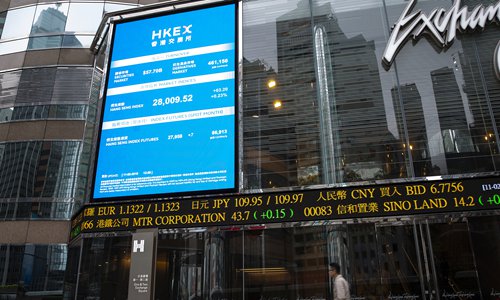HOME >> BUSINESS
HK remains finance hub despite riots
By Huang Ge and Chen Qingqing Source:Global Times Published: 2019/7/17 21:08:40
‘One country, two systems’ policy supports city’s economy

A view of the Hong Kong Stock Exchange's building in February Photo: VCG
Social unrest in Hong Kong is weighing on business sentiment and local capital market, which faces a bumpy road after several companies dropped or delayed their IPO plans. However, the special administrative region (SAR), as a global financial hub and the freest market, is expected to remain competitive under the policy of "one country, two systems," business representatives said.
Budweiser Brewing Co APAC, the Asia-Pacific business of Anheuser-Busch InBev, canceled its fundraising on the Hong Kong bourse, Reuters reported. This move followed several other companies delaying their Hong Kong listing plans, which sparked concerns about whether the SAR has been losing its edge amid repeated social protests over the past month, some of which have turned to be violent.
Logistics developer ESR Cayman said last week that it would postpone its listing on the Stock Exchange of Hong Kong (HKEX), and some analysts said that market sentiment dimmed after the protests. Companies have concerns over the timing of fundraising in the city, the South China Morning Post reported.
Recent demonstrations by radical activists have imposed challenges on the social governance of Hong Kong, which, to some extent, will affect investors' confidence in the capital market and weaken its role in the world economy, Dong Shaopeng, an expert advisor for the China Securities Regulatory Commission, told the Global Times on Wednesday.
However, Dong said, companies that halt IPO plans will not become a trend. Rather, it's a "passing phenomenon" reflecting individual companies' thinking.
Li Xiaojia, HKEX chief executive, said he remains optimistic on Hong Kong's IPO market. Over the years, the Hong Kong bourse has seen many ups and downs.
Hong Kong has the ability to overcome pressure at the moment and continue to provide services for global investors as a free port and global financial hub, experts said, noting that a financial crisis isn't likely to break out in the region as China's central government will support Hong Kong's economic stability.
Resilience, advantages
The city's stability and prosperity have always depended upon the successful implementation of the "one country, two systems" principle, which has also enhanced its strength as an international business and trade center, business representatives said.
Based on the policy, Hong Kong serves as the main distribution center for the offshore yuan and supports economic development of the Chinese mainland, said Qi Mingyang, chairman of Shenzhen-based asset management firm Fortune Valley Capital Investment Group.
"As a highly liberalized market operating under the rule of law, Hong Kong will not see a fundamental negative impact stemming from recent chaos," Qi said, noting its market position as a free port and international capital investment center will not change.
Still, some private bankers are reportedly shifting their wealth out of Hong Kong to places like Singapore, according to media reports. Hong Kong's economy has started to feel pain as radical protesters take aim at shopping and retail districts and even tourists.
Hong Kong officials have denied reports about outflows of capital, which might have triggered panic among investors.
The authorities have not seen obvious capital outflows lately, and the local market remains normal despite protests, which always welcomes investors from other places to do business, Paul Chan Mo-po, Hong Kong's financial secretary, told a briefing on Monday.
Beijing will continue supporting Hong Kong as it did during the Asian financial crisis in 1997 and 1998, and Beijing is also well-positioned to back up the city's economy and strengthen its business confidence through the Greater Bay Area project.
"The Shanghai-Hong Kong Stock Connect and Shenzhen-Hong Kong Stock Connect programs are expected to further expand and allow more mainland investors to participate in Hong Kong's market and vice versa," Dong said.
Posted in: ECONOMY